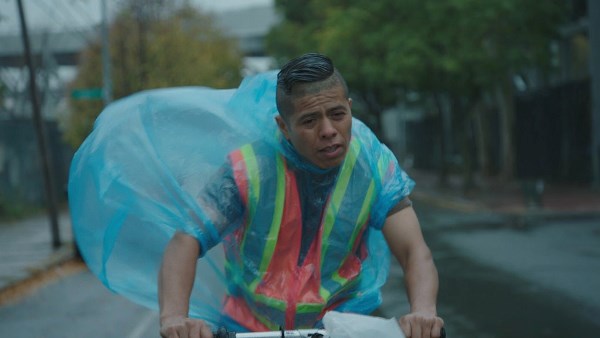![]() En el Séptimo Día’s plot follows a recognizable template—that of a sports team preparing for a big game—but it focuses on characters we rarely see in feature films as the main characters: undocumented Mexican immigrants. Shot and acted with a persuasive naturalism, the film is an understated and affecting exploration of this world, one that leaves the viewer painfully aware of how few such portraits there are in narrative films.
En el Séptimo Día’s plot follows a recognizable template—that of a sports team preparing for a big game—but it focuses on characters we rarely see in feature films as the main characters: undocumented Mexican immigrants. Shot and acted with a persuasive naturalism, the film is an understated and affecting exploration of this world, one that leaves the viewer painfully aware of how few such portraits there are in narrative films.
José (Fernando Cardona) is the captain and best player of a soccer team in Brooklyn’s Sunset Park. He and his teammates are all undocumented. José is also the fastest delivery man at a popular Mexican restaurant. When his team makes it to the finals, he discovers that his boss, a man both unsympathetic and uncurious, needs him to work the day of the big game and won’t take no for an answer. José needs the job to bring his pregnant wife to the States, and he’s also aware that his team will lose the game without him. The film follows him day by day as he struggles to make his decision, or rather, with the knowledge that he will need to let his teammates down.
The film is notable for the ease with which it reveals José traversing between worlds and levels of wealth. He visits his friends who work cutting flowers, peeling carrots in small grocery stores, mopping the floor in what could be a brothel or a peepshow. Though we might hear them complain from time to time, and it is clear the men’s lives aren’t easy, there is a healthy sense of camaraderie between them. José also enters predominantly white spaces to make deliveries and is often treated callously or not noticed.
This may be the first film since the advent of Grubhub and Seamless to portray the workers on the other end of the app. In doing so, director Jim McKay (who has directed a lot of peak TV since his last feature, 2004’s Everyday People) captures the jarring aspects of living in New York City, how different financial realities jostle up against one another and people take for granted what is a phone tap away. He presents this reality but does not overemphasize it, nor is any one moment made to look more dramatic than another. The office spaces with glass doors and hustling entrepreneurs are seen through the same photographic eye as the apartments of José and his friends.
José emerges as a compelling character partially because of the stoic grace with which Cardona plays him and because we see him in so many varied situations: speaking in broken English to a boss who takes him for granted, lying on his bed to Skype with his wife on his phone, and visiting his priest. By the end, we are fully aware of the forces that shape his life—societal, social, and personal—and of the different ways he must behave to satisfy whoever he is speaking to.
The ending is quietly satisfying, and I won’t ruin it except to say that McKay subtly subverts the trope of the white savior. En el Séptimo Día (On the Seventh Day) is commendable for the quiet elegance with which it brings to life a Brooklyn, and an America, that most filmmakers ignore. Moonlight and The Florida Project also embraced all-too real, rarely seen Americas in recent years. Let us hope that there will be more such films in the future.







Leave A Comment